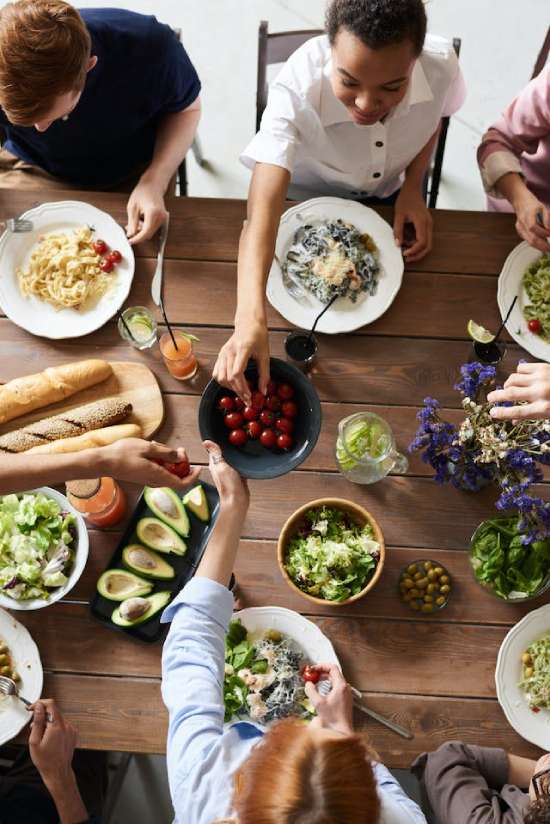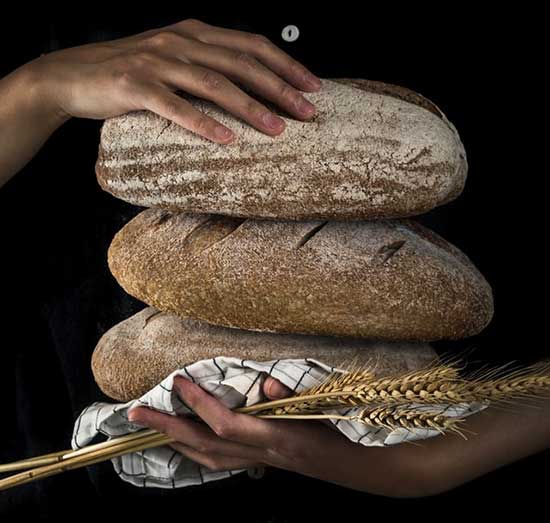For Seventh-day Adventists, sharing a Sabbath meal with friends and family is one of the most special and memorable parts of the Sabbath.
That’s why we want to share with you all about Sabbath meals and why they’re such a valued tradition in the Seventh-day Adventist church. We’ll answer questions like:
- What makes a Sabbath meal special, or different from other meals?
- Are there any Sabbath meal traditions?
- What does Sabbath meal preparation look like?
So let’s sit around the proverbial table and learn everything there is to know about Sabbath meals.
What makes a Sabbath meal special?

Photo by fauxels
Take a moment to remember some of your happiest memories: when you were at a special event, or with people that meant a lot to you, or a time when you were able to relax after a hard week.
In those memories, was food involved?
Chances are, your answer is “yes!”
And it’s no surprise, since sharing food is one of the best ways to build and cultivate relationships with other people.
That’s why a large part of what makes a Sabbath meal special is that it’s on the Sabbath, a day when we have time to spend with others while enjoying the world God made for us.
During the week, we’re often so busy that we aren’t able to eat together with our families, friends, or fellow church members. However, because Sabbath is meant to be a day of rest, we can be intentional about sitting down to share a special meal with other people.
This time also means that we can connect with people we don’t usually see during the week. Extended family, friends, church members, or church visitors are just some of the people we might see across the table from us at a Sabbath meal.
Sabbath meals are probably more essential now than they have ever been. In our technology-driven and distraction-laden society, sometimes we forget to slow down and truly spend time with each other: parents with children, couples with each other, and friends and family in general.
Truly, Sabbath meals are where we can reconnect with each other and with our Saviour.
In the Bible, we can see examples of Jesus sharing meals with others in order to connect with them as well.
Sabbath meals in the Bible
Jesus sharing meals with others is a common theme in the Gospels.
Sometimes the meals were simple like picking heads of grain in the fields with His disciples (Matthew 12:1-8). Other times they were extravagant, in the homes of wealthy members of society (Matthew 9:10-13). And other times, they were examples of Jesus’ love, mercy, and acceptance, and in turn, a way to share the gospel and Jesus’ gift of salvation (Mark 16:1; Luke 19:9-10).
Simple or extravagant, Jesus often connected with people over meals to share His mission on this earth with them.
One example was the Last Supper, right near the end of Jesus’ life and earthly ministry. During this Sabbath meal, Jesus exhibits one of the key features of sharing a meal with others: servant leadership.
Jesus takes the time to wash His disciples’ feet and show how we need to serve each other in the same way (John 13:12-15).
To Jesus, sharing a meal isn’t just about eating food in the presence of other people. It’s also about serving one another and letting that deepen your relationships.
Sharing a Sabbath meal together is also about remembering that God is our provider. The feeding of the 5,000 in the Bible is a good example of this.
When the disciples wanted to send the multitudes home because they were hungry, Jesus showed the disciples that He can provide for all. He blessed a small child’s contribution of 5 loaves of bread and 2 fish and fed 5,000+ people with it (Matthew 14:13-21).
We can use Jesus’ practice of service and His ability to provide for us as a model for our own Sabbath meals as a way to show love to others and to show God that we trust Him. Of course, the way that we do that changes from family to family.
So let’s talk about some of the traditions Adventists might follow to make Sabbath meals special.
What are some Sabbath meal traditions?

Photo by Richelieu
The fun thing about Sabbath meal traditions is that they are different for everyone. The Adventist Church is a global community, so one Sabbath meal might look totally different from another.
Some people eat similar things every week. Some families may have a type of soup and bread every Friday night, and some type of pasta at Sabbath lunch.
For others, they might try something new or exciting every week.
Sometimes, people prefer these meals to be formal, at a nicely-set table to make things extra special. Others might choose to keep things casual, modest, or low-key, even packing a picnic to eat outside in God’s nature.
While these traditions vary from family to family, there are some traditions that are common for many Adventists when it comes to eating together on Sabbath. Generally, Sabbath meals:
- Tend to be grander than other meals during the week
- Include a wider circle of people than the weekday meals, such as:
- Friends
- Extended family
- Visitors from church
- New neighbors
- A family who just moved to the area
- Give guests an opportunity to get to know a new group of people without the pressure or formality of a church service
Along with this theme, many Adventist Churches host Sabbath meals for the purpose of fellowship. Church members can bring dishes to share, making it an eclectic feast. These meals are called potlucks, or “fellowship dinner.”
Whatever Sabbath meal traditions people might choose to keep, the important parts remain: good food, quality time with people we love, and a reminder that God sustains and takes care of us.
Now that we know what kinds of traditions are common for Sabbath meals, let’s take a look at Sabbath meal preparation.
How Adventists prepare for a Sabbath meal
Meal prep for Sabbath can also vary from family to family.
We keep the way we approach Sabbath preparation focused on Jesus rather than following strict human-made guidelines for food preparation on the Sabbath (Matthew 12:1-8).

Photo by Jimmy Dean on Unsplash
Adventists don’t generally consider setting up the Sabbath meal as “work” because we consider work as things that are obligatory or vocation-related, not something done willingly and enjoyably to promote togetherness. So, for Seventh-day Adventists, serving a meal on the Sabbath isn’t a sin and isn’t wrong.
However, preparing for the Sabbath ahead of time means that the Sabbath day can be truly restful for everyone, so we often try to make food on Friday during the day, and leave the finishing touches for right before the meal.
Some ideas for Sabbath preparation include cooking ahead of time, freezing, and reheating on the Sabbath. Some might also use a slow cooker recipe to make things more effortless, and to be hot and ready at just the right time. These help keep us focused on God and keep our Sabbaths stress free!
Whenever that’s not possible—because sometimes life is busy and preparing ahead of time is difficult—Sabbath meals can also be simple and still be nourishing, and involve everyone’s help for cooking and cleanup.
Sabbath meals help us enjoy the blessings of Sabbath
However you enjoy your Sabbath meals—whether that’s preparing ahead of time and reheating food, joining with a church family at their home, eating the same thing every week, or eating something new every week—the best things about Sabbath meals are slowing down, spending time with people we love, and remembering how God sustains and takes care of us.
You can start your own Sabbath meal traditions today!
Related Articles
More Answers
What Is ASI (Adventist-Laymen’s Services and Industries)?
ASI, which stands for Adventist-laymen’s Services and Industries, is a membership-based organization that provides support for Seventh-day Adventist laypeople (Adventist professionals who aren’t pastors).
Sola Scriptura—What Does It Mean, and Why Is It So Important?
Sola scriptura is a term that originated during the Protestant Reformation. It represents the way many Christians view the Bible and its authority.
What is the Concept of “Present Truth” and Why is it Important?
Present truth is the principle that certain biblical truths are relevant to God’s people at specific times in history. God sends the Holy Spirit to reveal truths that help us better understand how to interpret and apply His Word in a present moment.
What Does the Bible Say About Modesty
The Bible teaches that modesty, a form of humility and respect, is a valuable quality in everyone—men, women and children. It has to do with how we present ourselves, which should exemplify our inner relationship with God.
13th Sabbath Offering: What It Is and Why It Matters
On the last Sabbath of every quarter, Adventist churches participate in the 13th Sabbath offering—a special offering that goes to mission fields around the world.
Adventist Movies: Where Faith and Film Meet
The Seventh-day Adventist Church’s mission from the beginning has been to share God’s truth in the Bible. And as times have changed, we’ve explored new ways of doing this—one of those being movies.
Everything You Need to Know About an Adventist Church Potluck
Every so often, usually on a schedule ranging from once a week to once a month to once a quarter, an Adventist church will have “fellowship dinners,” often casually referred to as potlucks.
How to Join the Seventh-day Adventist Church
Whether you heard about the Seventh-day Adventist Church through a traveling evangelist, during your online searches, or through a loved one or relative, you might be considering joining yourself.
How Do Adventists Make Movie and Music Choices?
We have entertainment at our fingertips. With just a tap on our smartphones, we can access all the latest movies, music, YouTube videos, and more.
Do Adventists Celebrate Birthdays?
Yes, most Seventh-day Adventists do celebrate birthdays because we see them as excellent reminders of the life God has blessed us with. And we celebrate them the same way everyone else does—with friends, family, presents, and a special meal.
Are Seventh-day Adventists Christians?
Yes, the Seventh-day Adventist Church is a Protestant Christian denomination formed in 1863. Just like other Christians, we believe that Jesus Christ is our Savior and seek to follow the principles of the Word of God.
Do Seventh-day Adventists Believe in the Secret Rapture
The secret rapture belief asserts that the followers of Jesus will be suddenly and stealthily “raptured” from earth and taken to heaven. Then, any people left on earth will face a period of great difficulty—before Christ’s second coming actually happens.
The Seventh-day Adventist Hymnal
The Seventh-day Adventist Hymnal is a songbook used worldwide by many Adventist congregations during their worship services. Since its publication in 1985, it has helped foster praise to God while reminding church members of our mission and drawing them closer to Jesus.
Do Adventists Have Their Own Bible?
Adventists have some unique beliefs—you might be able to name some of them right now. The seventh-day Sabbath. Death as a sleep. Hell as nonexistence.
Do Adventists Celebrate Communion and Foot Washing?
Like many Christian denominations, Adventists regularly participate in communion, also referred to as the “Lord’s Supper” or the “Last Supper.” They also practice foot washing (John 13:1-20), or the “ordinance of humility,” during the service—which isn’t as common.
How do Adventists choose what to eat?
Every day, parents go through the ritual of getting their kids to eat what is healthy and good while trying to steer them away from what can hinder the growth of their developing bodies. Nutritionists work with their clients to make better food choices.
What Are Seventh-Day Adventist Sermons Like?
In nearly every Seventh-day Adventist Church, the sermon is the focal point of the main service—similar to many Protestant Christian denominations. It is a time of biblical instruction by the pastor, who shares what they’ve been studying in the Bible and preparing over the previous week.
Didn’t find your answer? Ask us!
We understand your concern of having questions but not knowing who to ask—we’ve felt it ourselves. When you’re ready to learn more about Adventists, send us a question! We know a thing or two about Adventists.






















